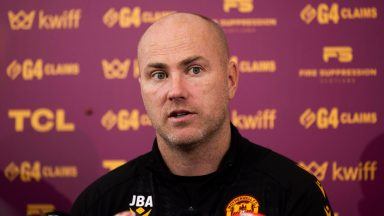In February, Scotland turned to the face the storm and came up agonisingly short.
World Cup runners-up England rocked up at Murrayfield with the tools to arm-wrestle Scotland into the clinging mud. Instead they found a side who had discovered a belligerence and a fighting spirit of their own.
In the end battle-hardened experience overcame Storm Ciara and, subsequently Scotland. England won 13-9 to reclaim the Calcutta Cup.
Fast forward through almost nine months and the advent of one deadly pandemic, and Scotland have the chance to show off everything they learned from that bruising 80 minutes at the start of the year.
Storm Aiden could play a large part in the spectacle at the empty Parc y Scarlets when the Six Nations finally concludes today and the scars Scotland earned against England will come in handy.
This is the start of a fresh World Cup cycle. Being knocked out at the Pool Stage in Japan meant a refresh of the Scotland squad was inevitable.
In truth, the natural evolution of this team arrived before the 2019 tournament as rising stars such as Jamie Ritchie, Zander Fagerson, Scott Cummings, Darcy Graham had already begun to supplant their richly experienced teammates.
The spring was the beginning of their time in these jerseys but, with a combination of injuries and the high profile exile of Finn Russell from the group, it has taken time for the sum of their talents to add up to victories in the Six Nations which began all those months ago.
The performance was there in Dublin but it lacked the killer touch to put Ireland away. Then there was the tight, exhausting, sodden disappointment at home to England.
In Rome, Scotland married dogged defence with a couple of flashes of attacking inspiration and suddenly the squad’s potential was growing into optimism.
When France – unbeaten and being tipped for a Grand Slam – were turned over in Edinburgh on March the 8th it was Scotland’s balance of toughness and guile that caused the upset.
And, despite the passage of time, there still feels to be momentum with Gregor Townsend and his team.
Form has stayed with most of the players. Stuart Hogg and Jonny Gray return as English and European champions and South African born Oli Kebble and Duhan van der Merwe add more depth and class since qualifying through residency.
Then there is Finn Russell.
His fall-out with Townsend was public and painful for both parties. Russell appears to have felt constricted by the head coach’s regime. Townsend wanted his fly half’s sublime talent to thrive in his meticulous structure.
These competing desires imploded under a critical breakdown in communication. However lockdown has allowed the pair to reconnect and start anew.
Townsend is talking up Russell’s mercurial brilliance, particularly his capability to bring the sublime to the field and unlock any defence put in front of him. The coach now seems to be keen to show acceptance that with Finn, comes risk.
The Racing 92 star used the media appearance after his 50th cap appearance against Georgia to emphasise that he is now fitting within an ecosystem in the squad.
He is helping Adam Hastings, his fellow number 10. He is contributing to team meetings but allowing others to steer the game plan when necessary.
It is a public show of reconciliation that bodes extremely well for Scotland.
Russell is back behind the steering wheel against Wales but the Scots are likely to need to his mature management side rather than his audacious gun slinging in the eye of a storm.
Wales are in transition but still boast the spine of a team that knows how to win test matches. Captain Alun Wyn Jones will become the most capped player in rugby history in this match.
Scotland have the talent to win. Can they show that they now have the strength of character too?

 SNS Group
SNS Group

























